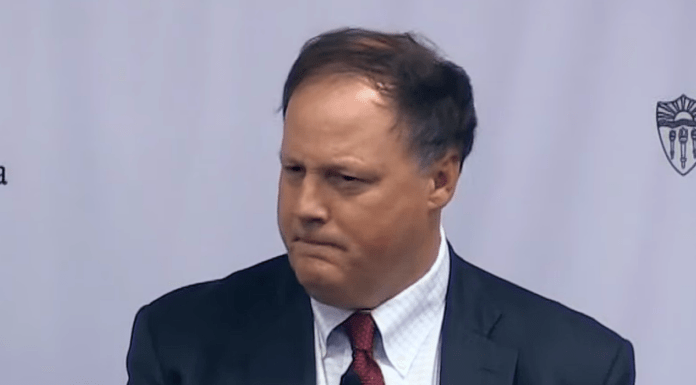(Ezekiel Loseke, Headline USA) Politico co-founder John F. Harris suggested rewriting the U.S. Constitution to eliminate the threat of Donald Trump and future MAGA candidates, in a column published Thursday.
“Trump is properly seen as a constitutional menace,” Harris claimed, articulating the view of his D.C. cocktail party acquaintances rather than the broader consensus of legal U.S. citizens.
However, the real problem with Trump is that he supports the Constitution.
“Trump may be an enemy of the Constitution but he is also the president who most zealously exploited its defects,” Harris griped.
He complained that the carefully considered system of checks and balances created bad optics for the radical Left, instead giving MAGA Republicans the high ground when it came to discussions about defending democracy and opposing the forces of tyranny.
“Expressing solemn reverence for the Constitution has become a way of signaling right-mindedness across the political spectrum, even among Trump supporters whose actions plainly undermine constitutional order,” Harris claimed.
But Harris conceded that those constitutional interpretations may well have aligned with the intentions of the Founding Fathers who drafted the documents and were likely white supremacists themselves.
“Who cares what they thought then?” he ranted.
Harris went on to list three grievances with the sacred founding documents that had hindered political elites on the Left from full enjoyment of it: the Electoral College, the lifetime appointment of Supreme Court Justices and the equality of states in the Senate.
“[F]rom a progressive perspective many of the most offensive features of his [President Trump’s] tenure were not in defiance of the Constitution,” he noted. “Instead, they flowed directly from its most problematic provisions.”
Regarding the Electoral College, Harris observed that Trump “was in office in the first place because the presidency is chosen by the Electoral College rather than by the popular vote.”
Proponents of the Constitution contend, of course, that without the Electoral College, larger states like California and New York would effectively disfranchise voters in the other states.
This is a particularly strong concern given Democrats’ open-border policies and recent overtures to allow illegal immigrants to vote in federal elections—assuring that they need only import the number of voters needed to retain power.
Harris went on to list two problems with the U.S. Supreme Court:
The first is that it obstructed progressive legislation by rudely deeming many of the overreaching Marxist initiatives under the Obama and Biden administrations to be unconstitutional.
The complaint seemed a bit disingenuous after Democrat activists routinely waged lawfare attacks on Trump to thwart his agenda—and continues to do so in attacking Republican governors and others with whom they disagree.
Harris’s second SCOTUS grievance was that it allowed Trump’s legacy to “live for decades because partisan manipulation of the Senate’s judicial confirmation power gave him three Supreme Court justices, who have no term limits.”
That manipulation, of course, began under the stewardship of former Senate Majority Leader Harry Reid, D-Nevada, who used the so-called nuclear option to end filibusters of federal judges (all of whom have lifelong terms) after several of then-President Barack Obama’s picks were delayed.
Although warned at the time that there may be potentially negative consequences under a Republican majority, Reid shrugged off the concerns.
However, the core issue Harris had with the Constitution was the equality of the states.
“There are more fundamental challenges embedded in the document itself—in particular the outsized power it gives to states, at a time when the most urgent problems and most credible remedies are national in character,” he claimed in his apologia for an all-powerful centralized government that, paired with his other “improvements,” would supply permanent majorities for the radical Left and no means of redress for the minority.
Harris seemed to recognize that, unfortunately, not everybody would be on board with his proposals—all of which have recently been floated by radical leftist lawmakers as well.
“So what will happen this time, when amending the Constitution seems improbable but living indefinitely with outdated provisions seems intolerable?” he asked.
“History suggests multiple possibilities,” he continued. “A decisive conflict is one answer—the reason talk of a ‘new Civil War’ is increasingly common.”
Barring that, he said, radical anti-constitutionalist factions would just have to wait for the necessary Overton window to push their changes in through the back door—or hope that they can slip it past the objectors when no one is paying attention.
He cited the Cold War as one such fortuitous circumstance, since the nuclear arms race helped concentrate more power on the federal executive branch.
“In the Cold War, presidents had (and still have) a power never contemplated in the Constitution—the ability to blow up the world with nuclear bombs on command, in minutes, with no approval by Congress or anyone else,” Harris said, wistfully lamenting the fall of the Soviet Union that restored America’s co-equal system of governance.
“Conflict, improvisation, good luck—likely all three will be required for the country to survive the coming constitutional showdown,” Harris concluded. “If successful, we can someday go back to not paying much attention to Constitution Day.”
While Politico has been known to show its far-left colors on occasion—notoriously getting busted for vetting its stories with the Clinton campaign during the 2016 election—the outlet was recently acquired by Mathias Döpfner, a Trump supporter, who threatens to impose greater objectivity in its newsroom.
That may destroy the liberal free spirit of the scrappy Capitol Hill trade paper founded by Harris and ex-Washington Post reporter Jim VandeHei in 2006, which became one of the first sites of its kind to leverage the power of the internet.
Fortunately for Döpfner, he can always follow the guiding words of the founder, should anyone object to the new changes: “Who cares what they thought then?”
Headline USA’s Ben Sellers contributed to this report.

